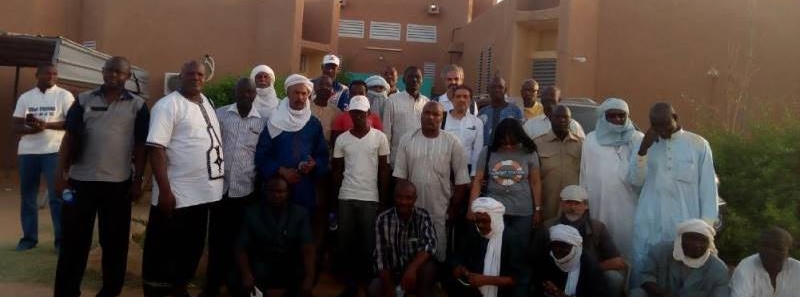
The steering committee of the Trade Union Network on Mediterranean Sub-Saharan Migration (RSMMS), decided in July 2017 in Tunis, as part of its program for the period 2017-2020, to send a delegation to meet migrants in their journey to find a job. The delegation was accompanied by the representatives of the International Trade Union Confederation Africa (ITUC-Africa), and the Organization of Trade Unions of West Africa (OTUWA) and supported by the PROMIG-FES project of the Friedrich Ebert Foundation (Tunis office).
The RSMMS network, which aims to help migrants in their journeys and their integrations, had to meet them in order to exchange with them and with all the actors as well as (local authorities, representatives of the population, NGOs, smugglers...).
After discussing the various groups and collecting the testimonies of migrants, the delegation made the following observations:
African countries like Niger, under the pressure of the European Union, have tightened their policies to stop migration. This country has enacted in 2015 the famous “LAW 036” which rendered illegal the migration of foreigners and this, in total contradiction with the ECOWAS agreements. This repressive policy, far from stopping the flow of migrants, makes their journeys even more difficult, risky and violent.
Migrants, who wish to continue their journey north, now avoid AGADEZ, where they could be arrested and returned to their countries of origin. They prefer to abandon their faith to the desert and risk extreme suffering, subjected to unscrupulous smugglers and ferocious brigands who abandon them more and more often.
When they arrive in Algeria or Libya, whether to cross the country or to stay and work, these migrants do not benefit from any right and risk at any moment to be expelled back to the border of Niger, stripped of all their goods and their revenues. These systematic practices are most often seen with local authorities.
Expelled from these countries and left in the middle of the desert, they are picked by the OlM whose main mission is to help them back to their country of origin. So those who do not intend to return are left to their fate.
This political choice to criminalize migration therefore has catastrophic repercussions, first and foremost on migrants who have to take bigger risks, who spend more money on mafia networks, and are forced to return home, before they undertake another journey at the cost of new expenses and new sufferings.
These security measures penalize the populations of the cities along their path. This is the case of AGADEZ, a city in the middle of the desert whose economy, historically, has been based primarily on the transit of travellers and goods. Due to the lack of employment, many vehicle drivers have turned into illegal smugglers, who have adopted, for many, criminal behaviour. European Union funds that would allow the conversion of former smugglers to other trades are still pending for over a year. In any case it is the entire economy of the Aïr region which is today collapsing. This situation, which impoverishes the majority of the population, (apart from the mafia networks), is developing xenophobic reactions against migrants who are no longer regarded as a source of income but as a burden they are not more able to assume alone.
Faced with this ineffective and dangerous policy advocated by the European Union and taken up by several African governments, the RSMMS delegation states that it is urgent to reject this so called “safe choice” (for Europe, not for migrants) . In order to reduce the level of violence, the violation of rights, the disproportionate expenses and the broken lives for migrants, it is essential to encourage legal migration channels which are the only ways that the migrants and the local populations will find peace and reconnect with economic development, now seized by criminal networks.
This repressive and inhuman policy is also hypocritical, because migrants go where labour calls them. It is therefore unacceptable to take advantage their labour power and once done, to violate their rights as humans and reject them at any time without any possible access to social justice.
This mission reaffirms one of the convictions of the RSMMS which is the urgency to return to a migration legal policy that is based on the rights of migrants. The RSMMS commits to fight for a dignified migration that is respectful of human rights, not only with its members but also with public authorities, employers and citizens of the member countries but also in the different regional and inter-regional meetings.
AGADEZ, October 18, 2017.
The members of the RSMMS delegation with the representatives of ITUC-Africa and OTUWA.
